Russia And Ukraine Conflict Takes To the Skies: Airline Sanctions Are Latest High-Flying Economic Battle

A new economic battleground is unfolding between Russia and Ukraine. The Ukrainian government announced last week a ban on Russian airlines flying into the country, and Russia struck back Monday, saying it would close its airspace to Ukraine. The bans have the potential to hit both nations' already struggling economies, reroute flights across a large part of Europe and lead to further economic disentanglement between the neighboring states.
“The cost of Russia-Ukraine ‘air wars’ is going to be in the tens, if not hundreds of millions, of U.S. dollars,” said Lilit Gevorgyan, a senior economist at IHS Global Insight, a global economics and risk analysis firm.
The aviation bans come as both economies have been battered by economic downturns. With both the U.S. and the European Union lobbing sanctions against Russian companies and individuals over its March 2014 annexation of Crimea and amid a decline in oil prices, the World Bank has predicted Russia's economy will contract by 3.8 percent this year. According to the World Bank's latest data from April, Ukraine's real GDP was expected to fall by over 7 percent, making Russia and Ukraine the world's two worst-growing economies, according to Bloomberg.
The "air wars" could affect millions of passengers and raise flight costs as airlines are forced to reroute by increasing flight times and fuel costs. Approximately 3.5 million people traveled between Russia and Ukraine in 2014, according to data from the International Air Transport Association, an airline industry trade association headquartered in Montreal. From May to August 2015, Russian airlines operated approximately 500 flights into Ukraine and 500 out, said Eurocontrol, an intergovernmental organization for air navigation headquartered in Brussels. There were approximately 4,300 overflights above Ukraine by Russian carriers during the same period.
"Russian planes with the Russian tricolor have no business in Ukrainian airports," said Ukraine’s Prime Minister Arseniy Yatsenyuk in a statement announcing the ban.

The neighboring countries that were both part of the Soviet Union have long had close economic ties. But with Russia's annexation of Crimea and a war pitting Ukrainian forces against Russian-backed separatists in eastern Ukraine that has taken the lives of approximately 8,000 people and displaced 1.4 million, those ties have increasingly frayed. The bold airline move on Ukraine’s part comes after years of economic battles with Russia ranging from fights over fuel to chocolate.
“Russia has pursued a vicious trade war against Ukraine,” said Anders Aslund, a senior fellow at the Atlantic Council, a think tank based in Washington. “Ukraine needs to do something to respond.”
Hanna Hopko, chairwoman of Ukraine’s Parliament’s Committee on Foreign Affairs, linked the ban to past trade disputes with Russia, as well as holding Russia accountable for its actions in Ukraine. “The ban will hurt Russia more than Ukraine,” she said in an interview this week. “Ukraine needs to get control back over its border with Russia.”
Ukraine was exploring further sanctions if Russia does not abide by the conditions of the Minsk II agreement that was signed in February with the hopes of ending the conflict in eastern Ukraine, Hopko said. “We need to revive our economy,” she said, noting it was time for Ukraine’s economy to continue reorienting itself away from Russia.
Under the aviation sanctions, the Ukrainian government targeted 21 Russian airlines, including the country’s largest airline and de facto state carrier, Aeroflot. Aeroflot is a publicly traded company listed on the Moscow Stock Exchange.
The Russian aviation industry had been hurting before the Ukrainian ban. Despite Aeroflot's 319.77 billion ruble ($4.88 billion) growth in revenue in 2014, an increase over 2013, it had a net loss of 17.146 billion rubles ($261 million) last year. Aeroflot’s low-budget airline Dobrolyot announced its closure in August 2014 after being listed on the EU’s sanctions list, the Moscow Times reported.
Transaero, an airline specifically targeted in the Ukrainian ban, said in an August 2014 statement, “In an economic situation that has been fairly described as a perfect storm, Transaero Airlines no doubt is experiencing difficulties.” Aeroflot agreed to take over a 75 percent stake in Transaero in September, Bloomberg reported.
Russia’s response will hit Ukraine’s largest carrier, Ukraine International Airlines, which is controlled by Ukrainian oligarch Igor Kolomoisky, a rival of Ukrainian President Petro Poroshenko. The airline flies over 10 times a week to Moscow and St. Petersburg. The company is privately owned.
It’s not the first time an airline ban has taken place in the region. Following the 2008 conflict between Russia and Georgia, which centered on the Georgian breakaway regions of South Ossetia and Abkhazia, an airline ban was put into place between Russia and Georgia.
Aslund said he expects the Ukrainian ban to hit the larger Russian airline industry much harder. “Ukraine does not need to fly over Russia,” he said. “Ukraine has a limited airline industry that goes to Middle Europe.”

With the bans set to begin in less than a month, major Russian and Ukrainian airlines will have to find alternative routes. A press representative from Aeroflot declined to discuss the upcoming ban, saying the company was still looking into the matter. A representative of Ukraine International Airlines provided a link to a webpage on ticket refunds.
Aeroflot has already started canceling its flights to the Ukrainian cities of Kiev, Kharkiv and Odessa, said Alex Kokcharov, an analyst focused on Europe and the Commonwealth of Independent States for IHS. Kokcharov said Russian airlines would likely have to reroute flights headed for Europe, Northern Africa and Turkey to avoid Ukraine. This would add additional flight time and added fuel costs. Exact figures were not available.
Russian carrier UTair was not part of the ban and stands to gain from it, as do other regional airlines in Belarus, Latvia and Turkey, Kokcharov said. Belarusian airline Belavia has already offered a new flight to Odessa and was considering additional flights to Kiev.
“Considering their financial struggles, the last thing that Ukrainian and Russian airline companies need is flight bans,” said Gevorgyan. “They are already suffering from economic contraction in their respective countries and weak consumer spending, particularly undermined by double-digit inflation and plunging value of Ukrainian and Russian currencies.”
The ban also has the potential to impact the wider region, Gevorgyan noted. With financial cuts, fewer airlines and cargo companies are now flying directly to Central Asia and the South Caucasus, instead taking routes through Kiev and Moscow, leaving fewer options for traveling to the region.
“It’s probably the real breakup of the Soviet Union only happening now,” said Kokcharov, describing the economic environment.
© Copyright IBTimes 2024. All rights reserved.






















